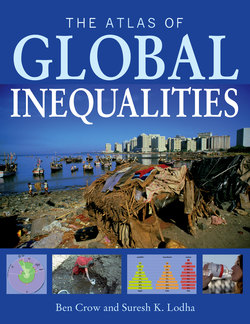Читать книгу The Atlas of Global Inequalities - Ben Crow - Страница 27
На сайте Литреса книга снята с продажи.
ОглавлениеPower Inequalities
R The division of the world into bounded societies under the authority of national governments, which emerged over the last two centuries, has been challenged in the last few decades by the growing interconnectedness of people and their activities. This process of global integration has diverse implications, from the apparent diminution of the power of national governments, through the rise of new global financial and environmental challenges, to questions about the adequacy of global representation, and the rising importance of global economic discourse and ideology. Nonetheless, national governments remain the dominant actors, and those that have industrialized are the most influential, with global power roughly corresponding to overall economic output. Fueled by the industrial revolution, the share of the world GDP contributed by the West has grown over the last two centuries, but since the beginning of the 21st century the hierarchy of power has begun to change with the rapid industrialization of the two massive economies of China and India. Countries that have been unable to industrialize have much less influence. Those with only a small number of exportable goods face an uphill struggle for foreign exchange and industrialization. The government of the largest economy, the USA, frequently acts as if it were the government of the world. On other occasions, self-appointed groups of industrialized countries, the G5, G8, and G20, make global decisions on certain topics, while avoiding discussion of others. Thus, these governments exercise ideological power by influencing the framework of desires and goals. They control the public agenda, and dominate international agreements on issues such as trade tariffs, intellectual property laws, agricultural subsidies, international aid, and military assistance. Military spending dwarfs spending on health and education in many countries. In OECD countries, it also overshadowed development assistance by a factor of around 10:1 in 2005. Greater possibilities for increased freedom and capabilities can emerge at local, national, and global levels if expenditure is directed to the improvement of equality of daily living conditions and security. The most intimate forms of power, in the home, over language and at work, are also influenced by government action and global ideas. These forms of power are difficult to map, although this section does explore how the power of citizens influences government, through the rise of democratic forms of government, and how the modern state exercises social control via imprisonment and execution.
27
Copyright © Myriad Editions
